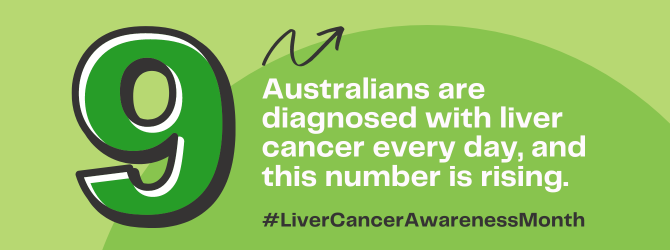Protect Your Liver: Take Action This Liver Cancer Awareness Month
October marks Liver Cancer Awareness Month, a time to reflect on the importance of liver health and the rising cases of liver cancer across Australia. Did you know that nine Australians are diagnosed with liver cancer every day, and this number continues to grow?
The primary cause of liver cancer is undiagnosed and untreated chronic hepatitis B and hepatitis C. These infections can quietly damage the liver over many years and lead to liver cancer if left unchecked. Other risk factors, such as metabolic-associated fatty liver disease, are also on the rise, further contributing to liver cancer cases.
But there’s good news: up to 70% of liver cancer cases are preventable. You can significantly reduce your risk by taking steps to protect your liver through regular check-ups, testing, and lifestyle changes.

Hepatitis B and Liver Cancer Risk
Vaccination is the best protection against hepatitis B. It is recommended that all children be vaccinated against hepatitis B as well as adults at increased risk.
If you’re living with hepatitis B, regular monitoring is key. Your liver can become damaged even if you feel well. Make sure to see your doctor every six months for a check-up. This will allow your healthcare provider to assess whether treatment is needed, which can lower your risk of developing liver cancer.
Hepatitis C: Treatment and Cure
For those living with hepatitis C, there are now highly effective treatments that can cure the infection. See your doctor about the best treatment option for you.
If your liver wasn’t damaged before treatment, your risk of developing liver cancer decreases to the same level as someone who’s never had hepatitis C. However, if you had advanced liver disease or cirrhosis before treatment, regular liver cancer screening is still important.
The Rising Concern of Metabolic-Associated Fatty Liver Disease
Another factor driving liver cancer cases is metabolic-associated fatty liver disease (MAFLD). Linked to obesity, type 2 diabetes, and unhealthy lifestyle habits, MAFLD can lead to liver inflammation and scarring, which raises the risk of liver cancer.
To reduce your risk of MAFLD and its complications:
- Maintain a healthy diet of whole foods like fruits, vegetables, and lean proteins.
- Engage in regular physical activity to help manage your weight and overall metabolic health.
- Limit alcohol consumption to reduce liver stress.
If you’re concerned about your liver health, speak to your GP. A liver health check, including blood tests and possibly imaging, can help assess the condition of your liver and determine if further steps, like treatment or lifestyle changes, are needed.
Take Action Today
Early detection, regular monitoring and timely treatment of hepatitis B and C can make a significant difference in preventing liver cancer. This Liver Cancer Awareness Month, take the following steps to protect your liver:
- Get tested for hepatitis B and C. It’s a simple and effective way to safeguard your liver health. Take our hepatitis risk quiz if you’re unsure if you should be tested.
- Get vaccinated for hepatitis B if you haven’t already. Vaccinations are free for some high-risk groups.
- See your doctor regularly for liver health checks, especially if you’re living with a chronic liver condition or other risk factors.
- Adopt healthy lifestyle habits: Eat whole foods, exercise regularly, and reduce alcohol intake to give your liver the best chance of staying healthy.
More Information
We’re here to support you. For more information on hepatitis testing and treatment call the Hepatitis Queensland Infoline on 1800 437 222. You can also learn more about cancer support and services at cancerqld.org.au.
Together, we can take the steps needed to stop liver cancer before it starts.
